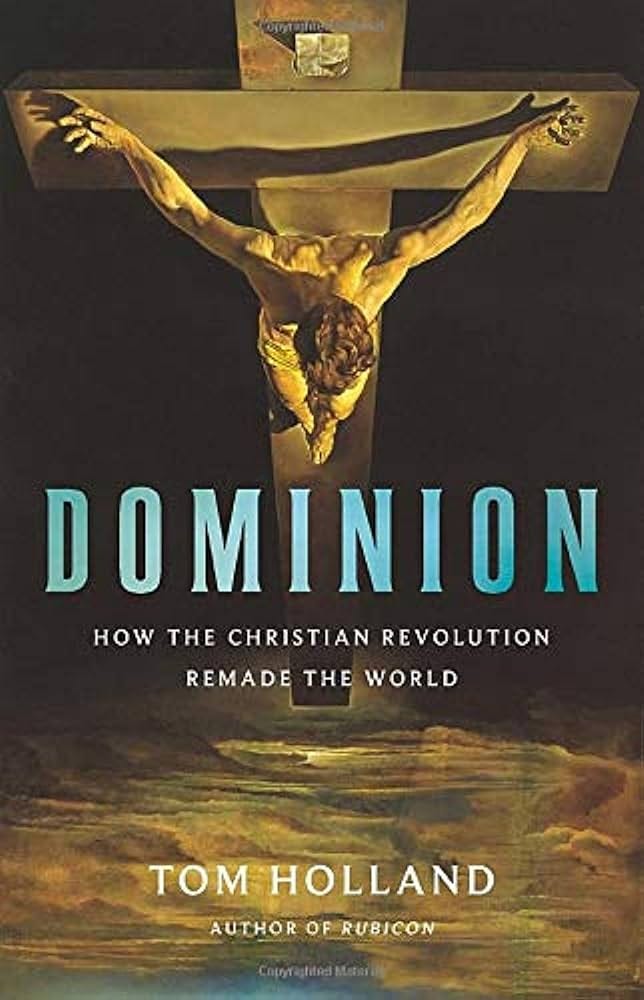I’ve been rereading historian Tom Holland’s great work, Dominion: The Making of the Western Mind. In it, Holland attempts to convince his readers that they are Christian, whether they like it or not. He writes,
To live in a Western country is to live in a society still utterly saturated by Christian concepts and assumptions. This is no less true for Jews or Muslims than it is for Catholics or Protestants…Whether it be the conviction that the workings of conscience are the surest determinants of good law, or that Church and state exist as distinct entities, or that polygamy is unacceptable, its trace elements are to be found everywhere in the West. Even to write about it in a Western language is to use words shot through with Christian connotations. ‘Religion’, ‘secular’, ‘atheist’; none of these are neutral. All, though they derive from the classical past, come freighted with the legacy of Christendom. Fail to appreciate this, and the risk is always of anachronism. The West, increasingly empty though the pews may be, remains firmly moored to its Christian past.
To prove this very simple point, that we are all of us indebted to Christianity for our basic values and moral assumptions, Holland sets up a contrast between the ancient, classical world, the world of Persia and Greece and Rome, with the world that came into being as a result of the cult who claimed that an itinerant Jewish preacher named Jesus was killed on a cross and raised from the dead, and that his resurrection proved that he is Lord of all. He shows, with vivid detail, the casual cruelty and horror of the ancient world, the ways in which violence and gore, rape and slavery, were not only commonplace, but were also never questioned morally; no Roman general came home worried about the slaughter he just oversaw. Instead, he celebrated it and widely hailed it as a sign that he was blessed by the gods and living out the Roman ideal. No Persian emperor ever questioned the extent of his cruelty, the hundreds of people impaled for their treachery; he saw it as the part of his destiny, to purge the world of the great lie. Holland gives story after story of just how different, just how cruel, just how alien this pre-Christian world is to us.
The point of the long, historical journey Holland takes us on in Dominion is to remind us that many of the basic values we hold in the West (invoked when we say or believe things such as “every person has equal worth”, “everyone should be treated equally before the law”, “we have a duty to care for the poor and vulnerable”, “men and women have equal value and worth”, “we should protect the rights of those who disagree with us”, etc.) are not universal, self-evident values but are in fact deeply rooted in the narrative, beliefs, and practices of Christianity.
Watch Holland, making this very point in an interview:
Why does this matter?
Knowing this history, for Christians, I think just gives us a bit of a confidence boost about our place in an increasingly post-Christian culture. A lot of intellectuals are beginning to realize that so much of what we take for granted is actually Christian (see nonbelievers like Elon Musk, atheist Richard Dawkins, journalist Douglass Murray, and many others identifying as “cultural Christians”). Many thinkers are seeing that we in the West have unwisely cut off the branch we are sitting on (listen to Justin Brierly’s podcast The Surprising Rebirth of Belief in God to hear story after story of intellectuals flirting with or actually converting to belief in God).
The question they all are asking is, if we reject Christianity, what will rise up to replace it? Is it possible to keep the fruit of Christianity (our basic moral values) and reject the root (faith that the Christian story is true)? Philosophically, logically, realistically, it’s not hard to see how quickly those values could lose their grounding in a post-Christian culture (the great anti-Christian ideologies of the 20th century, Nazism and communism, both led in a manner of a few years to the abandonment of these cultural norms). Many public figures, wisely, are wondering if we have made a mistake in abandoning the Christian faith.
And so, in light of this kind of encouraging openness to Christian faith, I believe one of the biggest tasks of the Church in the next few years will be not to prove that Christianity is true, but to persuade people that they want it to be true. I certainly believe that Christianity is true and holds up to scrutiny; but unless people want it to be true, they will not take the time or effort to investigate its claims. No one wants to read Mere Christianity if they think Christianity is a moral evil! But they might if they are dreaming and hoping that Jesus is who we are saying he is. And so, we can and should exist confidently as Christians, grateful for the gifts God through Christianity has given to the world and to our culture. By humbly, gently, and publicly asking questions about where our values actually come from, I believe we can make space for many people to heed the call of God to come home.
Though Tom Holland is not himself yet a believing Christian (see a recent essay here about him going to church), his book Dominion has already been a great gift to the Church, for eloquently and convincingly showing just how Christian even the critics of Christianity are. Who knows? Maybe it’s books like this that are heralding a new age of faith, a return to our ancient roots, a great awakening once again.
If you’d like to support my Substack financially, here’s a way to do it: click here to buy me a coffee!!





